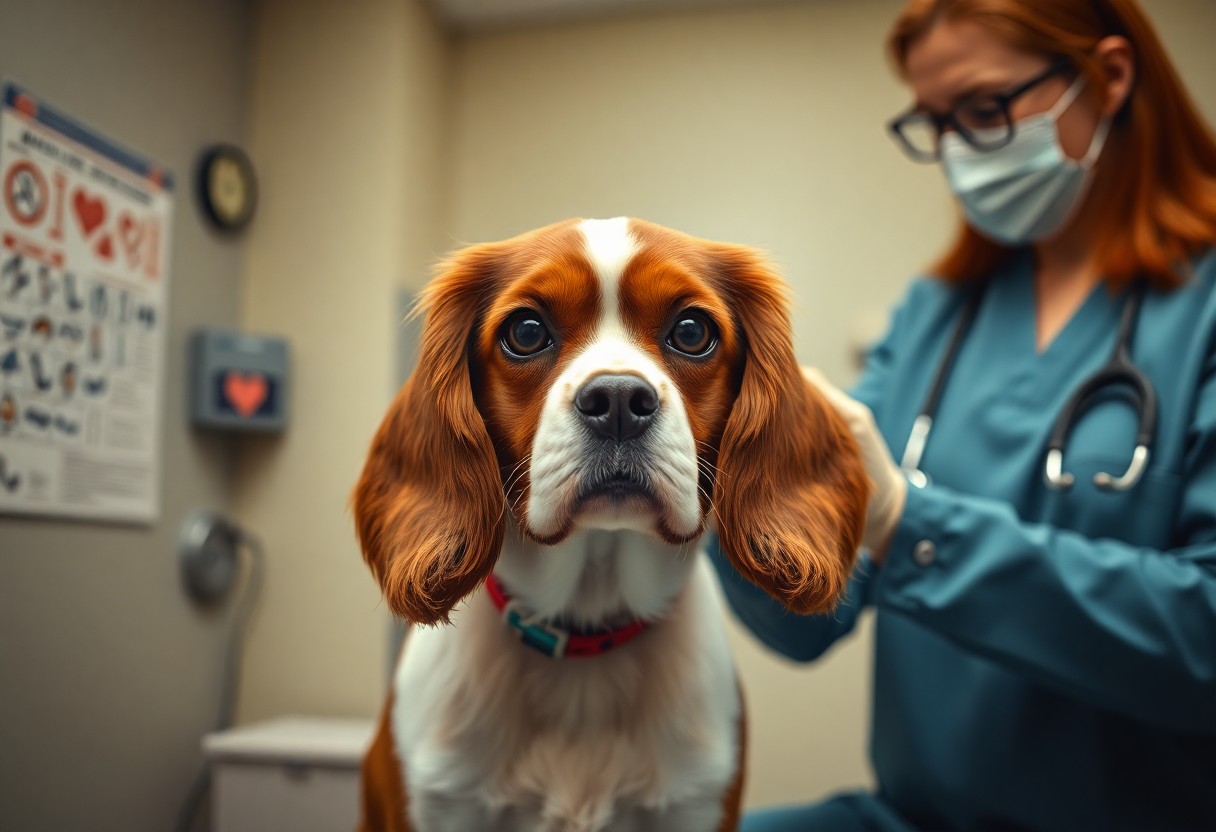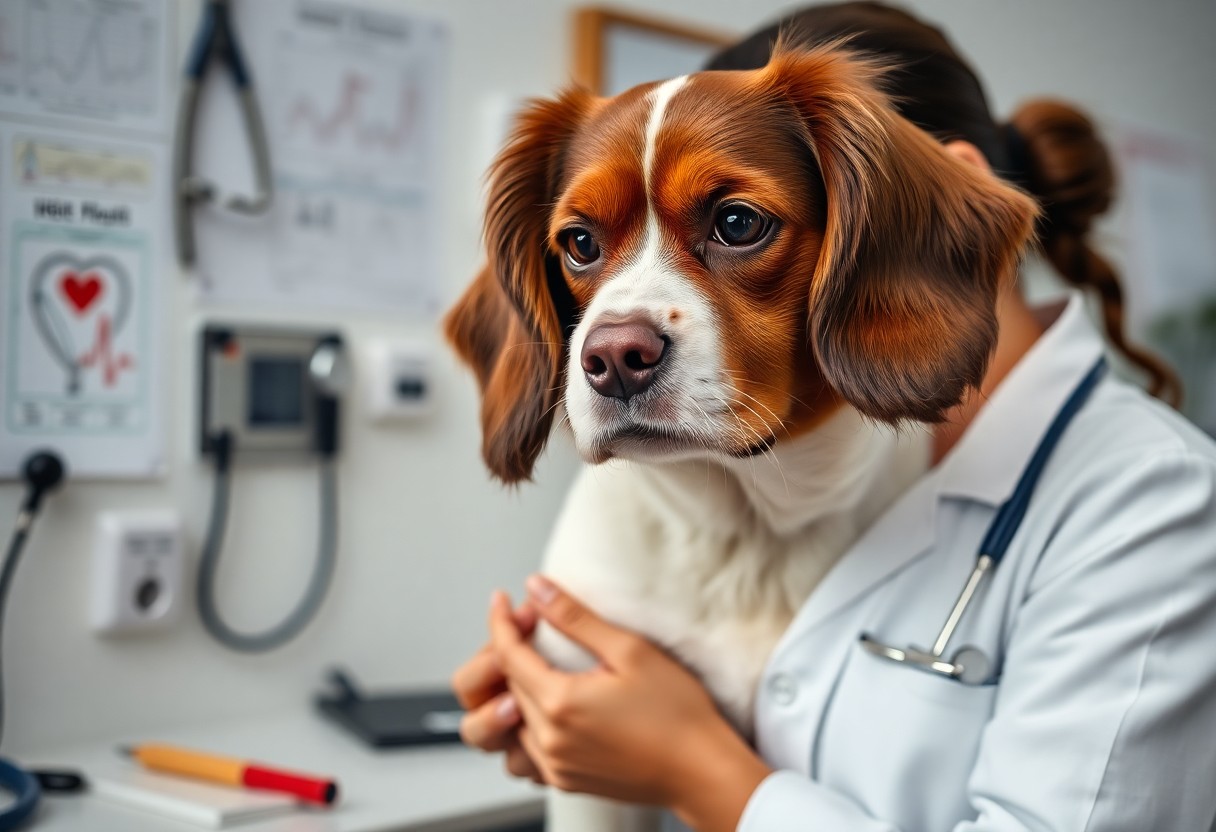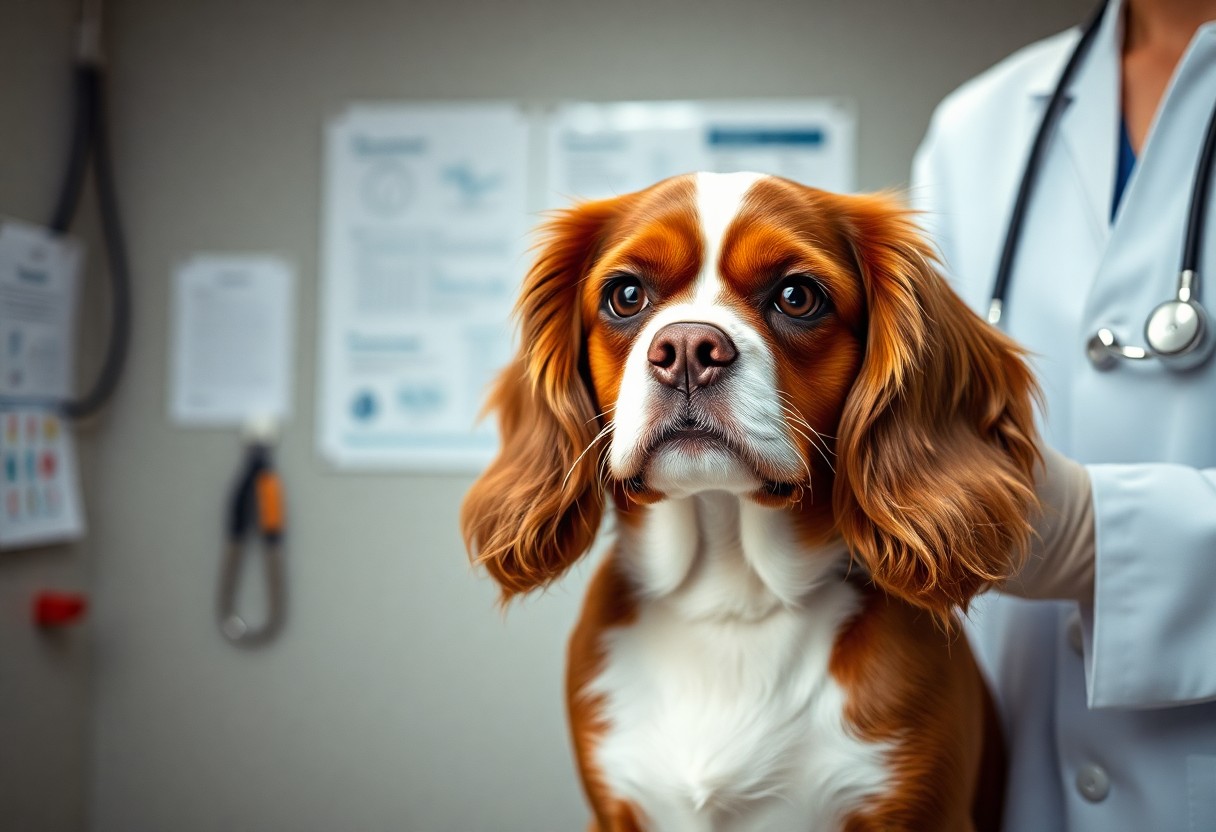It’s vital to be aware of the potential health issues faced by your Cavalier King Charles Spaniel to ensure they live a happy and healthy life. These charming companions are prone to several serious conditions, including mitral valve disease and Syringomyelia, which can significantly impact their quality of life. By understanding what to look out for and seeking timely veterinary advice, you can protect your beloved pet. For further information on What are the biggest health concerns for a Cavalier King …, keep reading to enhance your knowledge.
Key Takeaways:
- Cavalier King Charles Spaniels are prone to heart issues, particularly mitral valve disease, so regular veterinary check-ups are imperative.
- The breed is also susceptible to various eye conditions, including cataracts and retinal problems, highlighting the need for eye examinations.
- Back problems, especially syringomyelia, can affect Cavaliers due to their unique skull shape. Awareness of symptoms like scratching at the neck is important.
- Ear infections are common in this breed due to their floppy ears; maintaining proper ear hygiene can help prevent these issues.
- Joint problems, including patellar luxation, can occur, making it vital to monitor their mobility and seek veterinary advice for any lameness.
- Weight management is important, as obesity can exacerbate existing health conditions and lead to new issues, like diabetes.
- Regular dental care is important for Cavaliers, as they are prone to dental disease that can impact overall health.
Common Health Issues
For Cavalier King Charles Spaniels, it’s important to be vigilant about their health due to several common health issues. These charming dogs are prone to specific conditions, and early detection can lead to better outcomes. Regular veterinary check-ups and attentive care can significantly enhance your pet’s quality of life, allowing for a happier and healthier companionship.
Heart Problems
Health issues related to the heart, particularly mitral valve disease, are prevalent in Cavalier King Charles Spaniels. This condition can lead to heart failure if not addressed promptly. You should consult your veterinarian for regular heart evaluations, ensuring that any issues are caught early to provide your dog with the best chance at a long, healthy life.
Eye Conditions
Across the Cavalier breed, eye conditions such as cataracts and retinal problems are common. Being aware of these issues can help you seek treatment swiftly if your dog exhibits symptoms like cloudiness in their eyes or changes in vision.
Hence, it’s vital to monitor your Cavalier King Charles Spaniel for signs of eye troubles, as cataracts can lead to blindness if left untreated. Regular veterinary eye check-ups can catch problems early, and many treatments can help maintain your dog’s sight. By staying informed and proactive about their eye health, you can ensure your beloved companion maintains a good quality of life.
Genetic Predispositions
If you are considering bringing a Cavalier King Charles Spaniel into your home, it’s imperative to be aware of their genetic predispositions to certain health issues. This breed is susceptible to various conditions, and you can learn about 7 Common Health Conditions in Cavalier King Charles Spaniels to better prepare yourself for their needs.
Syringomyelia
Syringomyelia is a severe neurological condition often affecting Cavalier King Charles Spaniels. It occurs when a cyst forms within the spinal cord, leading to pain and discomfort. As a responsible owner, you should be vigilant for signs such as scratching at the air or sensitivity around the neck, as early intervention can significantly improve your dog’s quality of life.
Hip Dysplasia
By understanding potential issues such as hip dysplasia, you can take proactive steps to ensure your Cavalier remains healthy. This condition is characterized by an improperly formed hip joint, which can lead to pain and mobility challenges as your dog ages.
Another factor to consider is that hip dysplasia can progressively worsen without early management. You should engage in routine veterinary check-ups and maintain a healthy weight for your pet, as this can reduce strain on the joints. Be on alert for symptoms like limping or difficulty standing, as these may indicate worsening conditions that could require surgical intervention or long-term pain management. Taking preventive measures today can lead to a healthier, happier life for your Cavalier King Charles Spaniel.
Symptoms to Monitor
Unlike many other breeds, Cavalier King Charles Spaniels are particularly prone to a variety of health issues. It’s important for you to stay vigilant and monitor your dog for any unusual symptoms, as early detection can lead to a better prognosis. Be aware of signs such as lethargy, rapid weight change, and altered appetite, which may indicate underlying health problems that need attention.
Breathing Difficulties
About 40% of Cavalier King Charles Spaniels may suffer from breathing difficulties due to their brachycephalic nature. If you notice any signs of labored breathing, wheezing, or excessive panting, it’s important to consult your veterinarian. These symptoms may indicate conditions like brachycephalic obstructive airway syndrome, which can impair your dog’s ability to breathe comfortably.
Changes in Behavior
An important sign to watch for is changes in behavior. If your usually friendly and playful Cavalier becomes withdrawn, anxious, or irritable, this may signal an underlying issue. Our pets communicate with us through their behavior, and these shifts can be indicators of pain, discomfort, or illness.
Further, you should take note of specific behavioral changes, such as increased aggression, lack of interest in activities, or altered sleeping patterns. Monitoring these behavioral shifts can help you identify health problems early on, as they may stem from conditions like chronic pain or mental health issues. Maintaining a close observation of your dog’s demeanor is vital to ensuring their well-being and supporting a healthier, happier life.
Preventative Care
Your Cavalier King Charles Spaniel’s health can be vastly improved with regular preventative care. By prioritizing routine veterinary visits, proper nutrition, and exercise, you can help reduce the risk of potential health issues. Keeping an eye on your dog’s weight, dental hygiene, and vaccination schedule is crucial. Preventative care lays the foundation for a long and healthy life for your beloved companion.
Regular Vet Check-ups
About every dog owner should schedule regular vet check-ups for their four-legged friends. These visits allow for early detection of health problems and provide crucial vaccinations and preventive treatments. A thorough examination can help identify hereditary conditions common in Cavalier King Charles Spaniels, making timely intervention possible.
Proper Nutrition
After ensuring regular vet visits, maintaining a balanced diet is key for your dog’s health. A proper nutrition plan tailored to the needs of Cavalier King Charles Spaniels can help prevent obesity, heart disease, and other health concerns.
Further, feeding your Cavalier high-quality, nutrient-rich food specifically formulated for small breeds can have a significant impact on their overall well-being. Look for foods that contain high levels of protein and crucial fatty acids while avoiding fillers and artificial additives. This breed is prone to conditions such as mitral valve disease and obesity, so ensuring your dog maintains a healthy weight through appropriate serving sizes is vital. Additionally, incorporating fresh fruits and vegetables can provide valuable vitamins and minerals, contributing to a longer and healthier life.
Treatment Options
After identifying potential health issues in your Cavalier King Charles Spaniel, exploring treatment options becomes imperative. Early intervention can help manage symptoms and improve your dog’s quality of life. Regular veterinary check-ups will guide you through the best treatment plans suited for your dog’s specific needs, including medication and, in some cases, surgery.
Medication
For managing specific conditions, your veterinarian may prescribe medication. This can include anti-inflammatory drugs, pain relievers, or heart medications tailored to your Cavalier’s health issues. Always follow your vet’s instructions regarding dosage and administration, as this will ensure your dog’s well-being and safety.
Surgery
After exhausting non-invasive treatment options, surgery may be necessary to address more severe health problems. This can involve procedures such as heart surgery or patella luxation repairs. You should consult with a specialist who can provide you with an understanding of the risks and benefits associated with these surgical interventions.
With any surgical procedure, it’s important to weigh the benefits against the risks. Post-operative care will be imperative for your Cavalier’s recovery, including monitoring for complications and following all aftercare instructions from your veterinarian. While surgery may seem daunting, it can lead to significant improvements in your dog’s health and quality of life. Trust your veterinarian to guide you through this process and help you make informed decisions.
Living with a Cavalier King Charles Spaniel
Despite their adorable appearance and loving nature, living with a Cavalier King Charles Spaniel requires attentiveness to their unique needs. These small dogs thrive on companionship and benefit from a consistent routine that includes regular exercise and mental stimulation. Their affectionate demeanor makes them delightful companions, but you should be prepared to address potential health issues that may arise, ensuring they enjoy a fulfilling life by your side.
Managing Health Challenges
Before bringing a Cavalier King Charles Spaniel into your home, it’s important to familiarize yourself with the health challenges they may face. Regular veterinary check-ups and a tailored healthcare plan can help mitigate potential risks. Staying informed about common conditions, such as mitral valve disease and hip dysplasia, allows you to take proactive measures for your furry friend’s well-being.
Quality of Life Considerations
With proper care and attention, your Cavalier King Charles Spaniel can lead a joyful and fulfilling life. Regular veterinary visits, a balanced diet, and adequate exercise can enhance their overall well-being. It’s important to observe their behavior and adjust their activities accordingly, especially if they show signs of fatigue or discomfort. A supportive environment, coupled with your love and attention, can significantly improve their happiness and longevity, ensuring every moment spent together is cherished.
It’s vital to prioritize your Cavalier’s quality of life by actively monitoring their health and adjusting their lifestyle as needed. Factors such as a nutritious diet, regular physical activity, and a comfortable living environment contribute to their overall happiness. Furthermore, engaging with them through play and social time can strengthen your bond and provide mental stimulation. As you navigate the joys and challenges of life with your Cavalier, focus on creating positive experiences that enhance both your lives in harmony.
Final Words
Following this, it’s important to stay vigilant about the health issues common in Cavalier King Charles Spaniels, such as mitral valve disease, syringomyelia, and hip dysplasia. Regular veterinary check-ups, a balanced diet, and active engagement can significantly mitigate these risks. By being proactive and observant, you can enhance your dog’s quality of life. Always consult your veterinarian with any concerns to ensure your furry friend remains happy and healthy.
FAQ
Q: What are common health issues that Cavalier King Charles Spaniels face?
A: Cavalier King Charles Spaniels are prone to a variety of health problems, including mitral valve disease (MVD), syringomyelia (SM), hip dysplasia, ear infections, and patellar luxation. Regular veterinary check-ups can help identify and manage these conditions early.
Q: How can I detect heart problems in my Cavalier King Charles Spaniel?
A: Symptoms of heart problems in Cavaliers may include coughing, difficulty breathing, lethargy, and a decreased willingness to exercise. Regular veterinary examinations, including heart screenings, can help assess heart health and catch issues early.
Q: What is syringomyelia, and how does it affect Cavaliers?
A: Syringomyelia is a neurological condition where fluid-filled cavities develop within the spinal cord, often linked to skull structure. Cavaliers may exhibit signs such as scratching at the neck, sensitivity to touch, and impaired coordination. Diagnosis typically involves MRI imaging.
Q: Are there preventative measures for hip dysplasia in Cavaliers?
A: While hip dysplasia has a genetic component, maintaining a healthy weight, providing balanced nutrition, and ensuring appropriate exercise can help reduce the risk. Hip health screenings through X-rays by a veterinarian can also assist in early detection.
Q: How can I tell if my Cavalier has an ear infection?
A: Signs of ear infections in Cavaliers can include head shaking, scratching at the ears, a foul odor, redness, or discharge. Regular ear cleaning and check-ups can help prevent infections and maintain ear health.
Q: What role does routine vet care play in my Cavalier’s health?
A: Routine veterinary care is important in monitoring for health issues, administering vaccinations, and providing preventive treatments. Regular visits allow for early detection of potential problems, thereby increasing the chances of effective treatment.
Q: How can I improve the overall health and well-being of my Cavalier King Charles Spaniel?
A: To enhance your Cavalier’s overall health, ensure a balanced diet, regular grooming, sufficient exercise, and mental stimulation. Additionally, maintaining a good relationship with a veterinarian for routine check-ups and immediate care when needed is important for your dog’s well-being.


